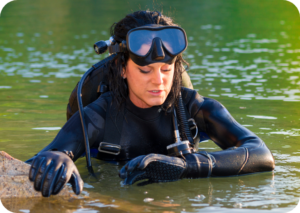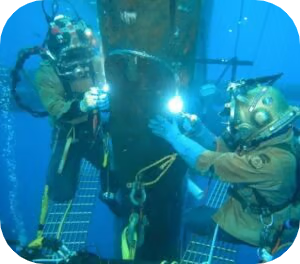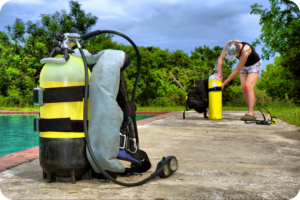Discover the Process to Secure Scuba Diver Life Insurance with Preferred Rates in [2024]
Are you a scuba diver who values peace of mind? You can apply for life insurance specifically designed for scuba divers. We understand your passion for exploring the depths of the ocean, and we want to ensure your safety on every dive.
understand your passion for exploring the depths of the ocean, and we want to ensure your safety on every dive.
With our extensive network of over 40 competitive insurers, we make it easy to find the best rates for scuba diving life insurance tailored to your needs. Don’t let the risks of underwater adventures hold you back.
Scuba diving is, without question, a fantastic sport, and I know that from first-hand experience. Over 1.3 million people in the United States are divers and I am also active in this great sport.
Like other risky sports, you can still qualify for preferred rates if you apply with the correct carriers. How to get the best rates for scuba divers is explained in this article, so keep reading.
Obtaining affordable life insurance for scuba divers has become a common achievement thanks to relaxed underwriting guidelines
Table of Contents
- Divers With Medical Conditions
- Does Scuba Diving Affect Rates?
- The Best Companies for Scuba Divers
- Can the Way I Dive Affect My Rates?
- How Much Does Diving Insurance Cost?
- Recreational Diving vs. Commercial Diving
- Best Types of Life Insurance for Divers
- Life Insurance Quotes for Scuba Divers
- In Conclusion
Life Insurance Options for Scuba Divers with Health Conditions
I will start with life insurance for divers with medical conditions because the carriers are more concerned with your health than your driving habits.
Anytime you apply for coverage, your health will always be an essential subject, regardless of a possible hazardous occupation, sport, or hobby.
Your rates will be based mainly on your overall health. This will also include significant variables such as being overweight, smoking cigarettes, having a heart condition, etc.
The underwriters will be very concerned about having a medical crisis while you are under water which significantly intensifies the problem.
This would be the same story if you were a pilot and suffered a medical issue at 5,000 feet in the air, for example.
Does Engaging in Scuba Diving Affect the Price of Life Insurance?
In many cases, your rates will not increase at all. It all depends on your specific diving habits.
Before we proceed, we learn how to get the best life insurance rates for scuba divers. But check out these other essential factors when calculating your rates. Or even your eligibility to purchase affordable term life insurance for scuba diving.
Your Age:
Your age plays an important part in determining your premium. The older you are, the higher the premium. Therefore, if you need divers insurance, apply as soon as possible. It will only become more expensive once you apply if you put it off.
Health History:
Your current health is one of the life insurance companies’ essential factors. The more medical issues you have, the more likely your rates will increase, or you will possibly be declined. Your height and weight are also critical decision-makers.
Occupation:
Your rates can be affected if you have a hazardous job. For example, dangerous jobs like Iron Workers, Commercial fishermen, and Pilots, to name a few, can increase your rates.
Credit History:
Your rates can easily be affected if you have poor credit. The statistics show that people with poor credit ratings are more likely to trigger insurance claims.
Driving Record:
Your driving record reveals your respect for the law and your degree of responsibility. Unfortunately, people with poor driving records are more likely to have an auto accident, resulting in a fatality.
Parent Longevity:
A history of cancer, heart disease, and early death (before age 60) can cause your rates to increase. This pertains to your parents and siblings. Your genes can pass down these medical concerns.
Face Amount:
The more significant the policy face amount (death benefit) you choose, the more expensive your policy will be. The longer the term period you select will also increase your premiums.
Tobacco Use:
If you use tobacco products, primarily smoking cigarettes, your rates can skyrocket. Cigarette smokers usually pay about $300% more in premiums. The most costly event you will find is applying for diving insurance while smoking cigarettes.
How Much Does Scuba Diving Life Insurance Cost?
Many times it does not cost a dime more than if you did not dive at all.
The cost of life insurance for divers will depend on several essential categories. We recommend running a quick 5-minute medical prescreen to get a good idea of what company to use and what health classification you may be assigned.
We recommend running a quick 5-minute medical prescreen to get a good idea of what company to use and what health classification you may be assigned.
A simple 5-10 minute pre-screen entails answering a few questions on our online medical assessment form or just by calling us on the phone. Of course, this will not be necessary if you are in excellent medical condition and do not take any medication.
You can use our instant quoting system to compare life insurance quotes for scuba divers from over 40 carriers. If you want to get your quote quickly, call us and we will be happy to quote you right over the phone.
These Are Some of the Underwriting Categories That Your Rates Will Be Based On:
1. Your Current Age
2. Tobacco Use (cigarettes, cigars, snuff
3. Medical Conditions & Medications
4. Para-Med Nurse Exam Results
5. Driving Record (motor vehicle report)
6. Parent Longevity (heart disease or cancer)
7. Medical Records (from your physician’s office)
8. Height & Weight (overweight or obese)
9. M.I.B. Report Results
This may appear complex, but rest assured, it isn’t. We handle most of the process when you apply. All that’s required of you is to answer some questions via a phone application.
What Do Flat Extra Fees Signify for Diving Insurance?
Flat extra fees may be assigned for many hazardous sports or occupations, not just diving.
Flat extra charges or fees are applied to add a dollar amount to a policy’s premiums to cover the additional risk the company is taking. These fees are sometimes added based on statistics of divers losing their lives while diving.
For example, we will take a 30-year-old male who wants to purchase life insurance for wreck diving because wreck diving in deep water is known to be very risky, especially at depths over 200 feet.
A life insurance company may add a $2.50 flat extra charge to the 30-year-old divers 20-year term policy. If the diver purchases a $250,000 policy, you would add $2.50 to each $1,000.00 in coverage.
An Example of a Flat Extra Fee:
Here is what the breakdown would look like for a scuba diver applying for a 20-year term policy with a base premium of $1,200.00 per year:
The flat extra fee of $2.50 is multiplied by 250 because the face amount is $250,000 would then have a formula of 250 times the $2.50 for $$625.00. Add this $625.00 to the base premium of $1,200.00 per year, and you have $1,825.00.
In many cases, flat extra charges will not be applied to the cost of the policy. We utilize companies that traditionally do not use many additional fees to keep our clients’ premiums as low as possible.
Flat extra fees work the same way as other more dangerous types of diving such as ice diving and cave diving.
Diving insurance can be a little more complicated due to all the variables of the sport that people participate in.
Does Diving at Greater Depths Have an Effect on Rates?
How deep you dive is one of the most important questions an insurer will ask.
Your maximum dive depth is of great importance and impacts your rates. If you are looking for the absolute best rates for diving insurance, stay under 75 feet of depth.
diving insurance, stay under 75 feet of depth.
If you stay under 75 feet, you will qualify for a company’s best rates, such as “Preferred Best” or “Preferred.”
In addition, the statistics will indicate that your open water safety will significantly improve under 75 feet.
If you dive deeper than 100 feet, your preferred rates will usually be off the table, and you will then be able to achieve “Standard” rates at best with a limited amount of companies.
However, going past 100 feet will also trigger a “flat extra” charge of $2.50 with some insurers.
Can the Way I Dive Affect My Life Insurance Rates?
The way you dive has a direct impact on your rates. Here is a list of various forms of scuba diving that the carriers are the most concerned with.
These types of diving impose the highest risks:
1. Cave Diving Activities
2. Ice Diving Activities
3. Wreck Diving Activities
4. Deep Water Diving (over 200 feet)
5. Commercial Diving for Payment
6. Rescue Diving – Fire Department
7. Salvage Diving at Commercial Level
If you dive in lakes, rivers, and rock quarries for pleasure, your risks are minimal, and many times there is no additional cost associated with diving insurance.
Always Provide Honest Answers During the Application Process
All you have to do is simply answer each question honestly, no more and no less.
As with any insurance application, you should always be 100% truthful, not just for life insurance. However, the last mistake you want to make is not truthfully answering every question.
Failing to inform your insurance company could result in a declined death claim and your beneficiary being S.O.L.
You don’t have to respond with any additional information except for the answers to the specific questions on the application.
Scuba Diving Certification and Instruction
The first important factor is the training and certification of the diver. Remember that you must be certified by one of the three agencies to get your tank refilled with compressed air. Classroom instruction with written exams and open-water testing is mandatory for a certified scuba diver.
In addition, your safety underwater depends on your knowledge of the sport. Usually not being certified will typically result in an automatic decline in coverage.
Life insurance companies look for this, just like your driving classes’ first rules of thumb. Always make sure you always dive in with an experienced buddy.
Never go into the water if you do not feel good or are under the influence of alcohol or drugs. A simple sinus problem can cause a significant issue equalizing the pressure in your ears underwater.
These Are the Main Scuba Diver Certification Organizations:
NAUI:
NAUI stands for the National Association of Underwater Instructors, the organization I belong to. If you plan on traveling anywhere in the world scuba diving, NAUI is accepted worldwide. This is very important to ensure that your certification will gladly be taken in whatever water you dive in. Here is how to join the NAUI organization.
PADI:
PADI stands for the Professional Association of Diving Instructors and is an excellent avenue to achieving your scuba diving certification. This is one of the most popular organizations for scuba divers you can belong to. You will learn what you need to know, from the basics of equipment to open water dives. Learn more about how to join PADI and get scuba certified.
SSI:
S.S.I. stands for Scuba Schools International and has been in business for more than 45 years. S.S.I. is another excellent choice to consider and learn how to scuba dive safely and have fun doing it. Learn more about how to join S.S.I. and get properly certified.
Learning how to become a safe scuba diver revolves around your knowledge and training. Get as much training as possible to deduce your risk factors in the water.
Commercial Diving vs Pleasure Diving
Commercial dive insurance usually costs more due to the extensive risks that are taken.
There is a big difference in the risk between a recreational diver and a professional diver that dives for money. Commercial divers usually dive on a daily basis, unlike recreational divers, that go diving periodically on weekends.
Commercial divers usually dive on a daily basis, unlike recreational divers, that go diving periodically on weekends.
Commercial divers typically dive a lot deeper and also stay down longer. In addition, many commercial divers breathe mixed gasses instead of air due to Nitrogen Narcosis.
If you dive commercially, inform your agent immediately because this is an essential rating factor. We find that most people dive into local lakes and rivers periodically. This dramatically reduces the risk of having an underwater accident.
Scuba diver life insurance quotes will always be less for recreational divers than commercial divers.
What Type of Life Insurance Is Best for Scuba Divers?
Term Life Insurance:
Low-cost term life insurance is the most commonly purchased life insurance in the United States. Term life insurance covers a specific period before it terminates on the policy’s anniversary. You can call this a temporary form of life insurance.
insurance covers a specific period before it terminates on the policy’s anniversary. You can call this a temporary form of life insurance.
It can vary from 5, 10, 15, 20, 25, or 30-year intervals. Once these periods have occurred, the policy is no longer active. Due to the limited periods on these policies, they are the least expensive life insurance option.
Since nobody knows what the future has in store for us, it is good to apply for the most extended term period available. Term life insurance has the lowest life insurance rates of all plan designs.
Banner Life Insurance company has introduced a new 35-year and 40-year term product. You will find that a conventional term policy will always provide, by far, the lowest scuba diver’s quotes.
Universal Life:
Did you know that Universal Life has permanent coverage and is a modern-day, cost-effective replacement for expensive Whole Life plan designs?
Universal Life Insurance’s line of plan designs has a premium that remains the same for the policy’s lifetime. As long as the payments are being paid, the premium never changes.
The insured will still be covered under the terms of the policy. Universal Life has taken over as the go-to policy designed for people who want permanent coverage.
Purchasing life insurance designed to last the rest of your life gives you total peace of mind and protection. Universal Life insurance is a product you should consider because it never leaves any gaps in coverage as term insurance can. You can also combine terms along with universal life.
No Medical Exam Life Insurance:
No medical exam life insurance is an excellent product for people in good health, but it does cost a little more.
Very few people like to take a physical exam when applying for life insurance. Also, some folks need their divers insurance as soon as possible. No medical exam life insurance might be the answer in these cases. This type of insurance does not require a medical exam, and some companies will approve an application within 24 hours.
These plan designs usually cost more than the plans with complete underwriting requirements. However, in some cases, it might cost less to have a non-med policy than a conventional one. But again, your agent can make this judgment call and recommend the best route.
Optimal Rates Will Be Determined by Answers to These Five Questions
These are the most important questions you will find on your application.
Here are the essential factors that carriers normally consider when underwriting an application for dive insurance. Here is a list of these crucial questions the underwriters will want answered.
1. Are you a certified scuba diver (this will be mandatory)?
2. How many dives per year do you complete?
3. How deep do you usually dive?
4. Do you cave, wreck, ice, or salvage dive?
5. Do you perform any rescue dives or dive for hire?
Best Life Insurance Companies for Scuba Divers
Here are some of the companies with the best life insurance rates for scuba divers:
1. Lincoln Financial
2. Banner Life
3. Cincinnati Life
4. Mutual of Omaha
5. A.I.G. (American General)
6. John Hancock
7. Prudential
8. Protective Life
If you only drive occasionally and in shallow waters, you should find the best affordable life insurance rates. This is because the risk is significantly reduced compared to a professional scuba diver.
Professionals dive to earn an income, placing this person in a higher risk class.
A professional diver that dives daily will have a better chance of being injured or killed underwater. Certification as an instructor or advanced diver will help lower your premiums with many companies.
Getting the best rates depends on how safe your driving habits are and formal training.
Comparing Life Insurance Quotes for Scuba Divers
The rates can vary from one person to another based on your specific activities in the sport. Feel free to use our website quoting system on the right side of this page or our instant quote comparison page. You can see the many choices and get a general idea of how much your life insurance would cost.
We work with over 40 of the best life insurance companies. One important point to remember is that all carriers underwrite their applications differently from one another.
We can recommend a company that would be the best choice for your situation. They will consider your health history, height, weight, tobacco use, age, and several other types of information.
Rates Are Subject to Regulation Under State Laws
Life insurance rates do not fluctuate between agents and brokers for the same products.
If there is one good tip I could give you, this is it. Life insurance rates are regulated by law! This means that all life insurance rates are the same for the same product regardless of who you buy it from. This is about life insurance products from the same insurance company and plan design.
Many people bounce from website to website, shopping for the lowest rates only to look at the same rates on multiple website quote engines. Click on the link above or call your state’s Department of Insurance for verification.
Apply for Life Insurance for Scuba Divers Without a Medical Exam?
Yes, you can; these plan designs are called Non-Med or otherwise referred to as no medical exam life insurance policies. This means you do not have to take a physical exam.
Many people want life insurance but get nervous about an exam, especially with a blood test. Blood tests are usually the part people dislike the most, preventing people from applying for life insurance altogether.
Stop worrying because there is an easy way out if you fall into this category. No medical exam life insurance policies may be just the right plan design for you, and these plans can have approval times in less than 24 hours, which is a fraction of the time for fully underwritten plans.
Applying for Coverage Over the Phone?
There is no easier way to apply than over the telephone.
You usually have three different ways to apply for scuba diver life insurance. The first is the paper application; the second is the online application. The third and best way is to apply over the phone.
application; the second is the online application. The third and best way is to apply over the phone.
Applying over the phone is simple; it takes much less time and gives you the advantage of explaining your answers if needed.
Typical dive insurance telephone applications can take approximately 15-20 minutes. After that, you have to answer a few questions, and your agent performs all the other work.
How to Secure the Lowest Rates for Term Life Insurance in 2024
Our Final Thoughts
As mentioned at the beginning of this blog post, an independent agent like ourselves will perform all the leg work for you at no cost or obligation.
We can quickly find the lowest rates from the best life insurance companies for scuba diving.
Don’t hesitate to contact us seven days a week to get your questions answered. If you think applying for the best diving insurance is difficult or expensive, don’t give it another thought.
Happy diving and most of all, dive safe!
All the best,
Jack Venturi


